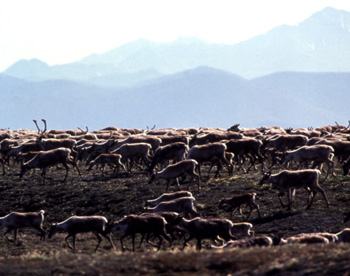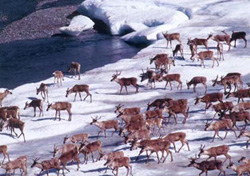Dangers and Problems
Drilling for oil in the pristine wilderness of the ANWR has its obvious disadvantages and dangers. One obvious danger is upsetting the fragile ecosystem. "The Arctic National Wildlife Refuge is one of America's greatest natural treasures. The 19 million-acre Refuge harbors an unparalleled diversity of wildlife. Encompassing an entire mountain range cross-section, it is the last place in North America where the full spectrum of arctic life is protected in one seamless expanse" [3]. 130,000 caribou, the last large migrating mammal in the U.S, migrate hundreds of miles to calf there in late May and June, in that one area, and that is where they want to put oil rigs. The polar bear population is already declining and is already threatened by extinction. The proposed oil and gas development would occur on the 1.5-million acre coastal plain found along the Beaufort Sea. This area is the most sensitive in the entire refuge and habitat loss that occurs here will impact the entire Arctic Refuge. The oil industry argues that they will only leave a small footprint on the Arctic, covering a mere 2000 acres. While this statement may be true factualy, it is in essence completely false: roads and flatforms and piplines will spread out all over the arctic causing fragmentation of the habitat. Drilling the refuge would require a large number of well pads, connected by pipelines, roads, airports, housing facilities, processing plants, and other infrastructure with effects that would radiate across the entire coastal plain. "Other industrial operations, such as seismic exploration, water withdrawals, gravel mines, noise from operations, air pollution, and exploratory drilling would have effects over a much larger area" [4]. Many American consumers consider oil drilling in sensitive ecosystems justified if they are paying less for gasoline. The arguement that the Government puts forth is the that drilling will reduce our dependency on foreign oil. However, the lowering of gas prices and our 'oil independence' is purely a myth. Drilling for oil in the ANWR will not end the depedence on the Persian Gulf or other oil imports. Many geologists estimate that there is very little oil beneath the refuge. It will take 15 to 20 years to get even get to market if oil is found and even then, the production from the refuge will not affect gasoline prices for Americans. The most influential danger in drilling in this sensitive ecosystem is considered a benefit to big oil companies. The precedent that will be created once the ANWR is tapped will lead to the devastation of countless wildlife reserves and national parks that are today considered to be protected. |
|
John Seward
EGR 3305 - Engineering Ethics
April 24th, 2005
Introduction click to view
An introduction to the ethics behind drilling for oil in sensitive ecosystems.
Benefits click to view
This section explores the possible benefits of drilling for oil in sensitive ecosystems as well as the parties that benefit from it.
Resources click to view
Resources for exploration of issues for and against the drilling for oil in sensitive ecosystems.


